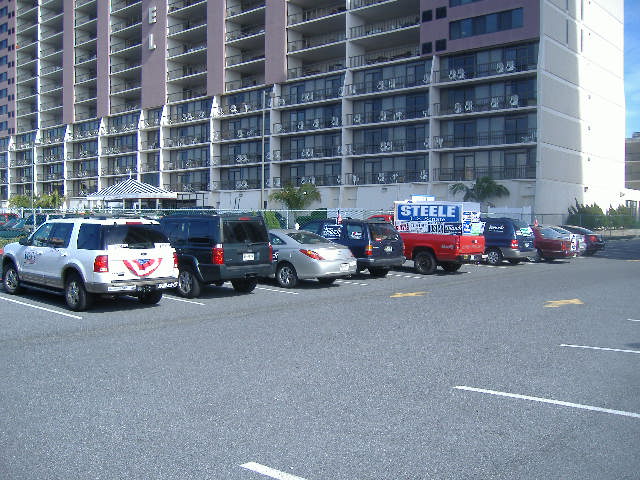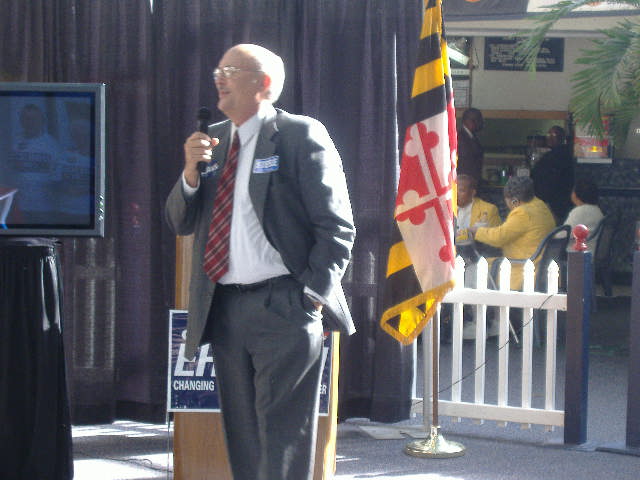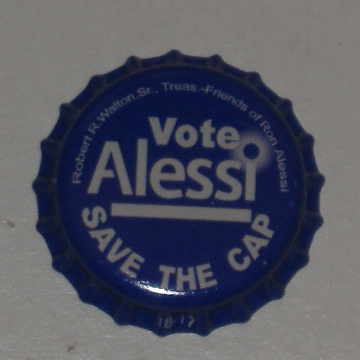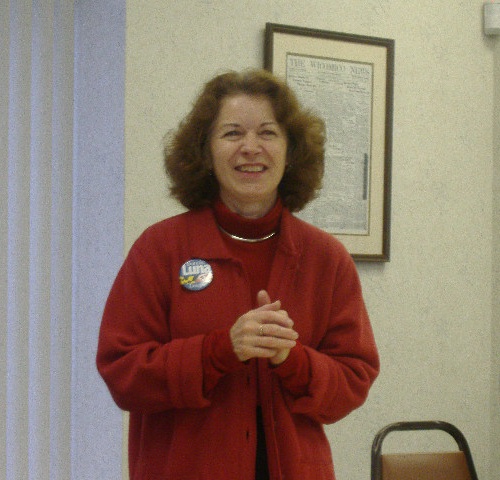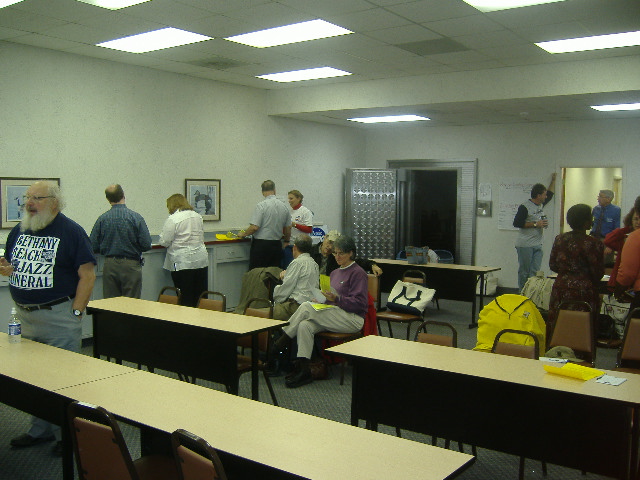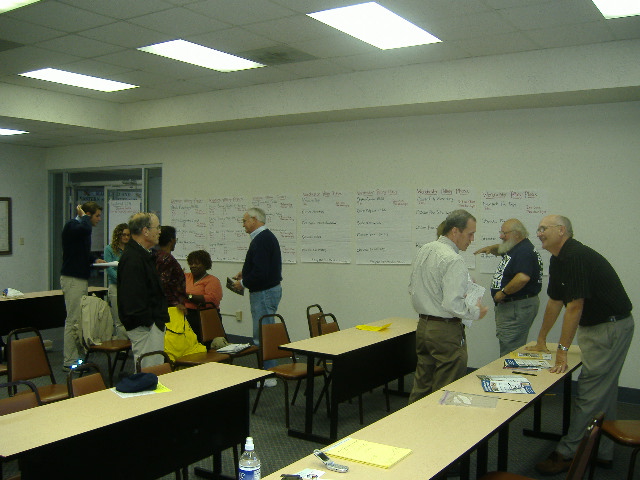Now I’m moving to the races for the State House of Delegates and Senate. I decided to do District 37 first because I have less interest in that side of Wicomico County, but many in Salisbury and the western half of the county do because it’s their district.
Here is a case where doing the Ten Questions earlier this summer comes in handy, and one thing I recall about the questions I wrote for the state races was that they lent themselves to good, short answers. So this post may not be so long – even more so because there’s only 2 contested races of the three (Delegate Rudy Cane of District 37A faced his sole opposition in the primary.)
Of the candidates in the district, I got answers from Senator Rich Colburn, Delegate Addie Eckardt, and Delegate candidate James Adkins. Also in the race for the Senate are Hilary Spence and write-in candidate Moonyene Jackson-Amis; other Delegate contenders are appointed incumbent Jeannie Haddaway and challenger Tim Quinn. For those folks, I’ll search through the information I have and attempt to answer these questions for them as I did for Michael Steele and Ben Cardin (no complaints yet from either campaign so I guess I represented both well.) However, if I find no information I’ll have to leave the question blank for that particular candidate.
I also have a forum that I attended which featured many of these candidates so I’ll place those thoughts at the end. This will be the sole portion where I can feature Jackson-Amis because she has no website nor have I gotten anything in the way of information on her campaign.
Here are the Ten Questions I used. The Senate candidates will be listed first, followed by House of Delegates hopefuls. I’ve left out Question #9 on early voting because it was ruled unconstitutional by the Maryland Court of Appeals so that made it irrelevant.
Question #1:
Some of you participated in the recent special session to modify the large rate hikes that were to be enacted by Baltimore Gas & Electric. However, our electrical rates from the local Eastern Shore suppliers went unchanged. With that in mind, would you be more in favor of a total repeal of the 1999 deregulation laws, or do you believe the concept is sound and only needs a few guardrails and rate safeguards?
Colburn: The Special Session did not address the interests of Eastern Shore residents. Experience has taught us that deregulation has not benefited the consumer in the State of Maryland. However, with that in mind, we should move carefully in regards to totally repealing the 1999 deregulation laws.
Adkins: I, like many other Maryland consumers, have yet to see the benefit of deregulation. The restructuring that took place in the late 90’s has failed to provide the consumer with the desired results. Unfortunately, the Public Service Commission may have also failed to represent the consumer as well as it could have. This is a very complicated matter and will have to reviewed and addressed in 2007 and beyond to ensure that whatever is done protects the consumer and strikes a balance between what is fair for the consumer and what is fair for the providers of electricity.
Eckardt: I did participate in the special session and did not vote for the bill that was presented and ultimately passed. During my tenure as Delegate I have closely followed the deregulation process. My understanding of the issue is that since the market in which Maryland is a player is mostly deregulated and the cost of power was increasing, deregulation in Maryland would bring the cost to consumers down and offer choices in the market place. Some legislators were not in favor of deregulation from the beginning and put many roadblocks to the plan. One was to put caps in place so that constituents would be guaranteed a stable low rate and the caps would come off in a defined period of time in a phased-in process according to the geographic areas of the state. In the meantime, costs across the county continued to rise due to increased usage. Other influencing factors contributing to the consumption of global resources were 9/11, the War, Katrina, Rita, and China. Maryland’s rates have remained artificially low because of the cap and I do believe lawmakers never anticipated the situation to turn out the way it did given the multiple catastrophes in play. I did not support the caps because I was concerned that the longer we delayed implementation of deregulation, the greater the possibility of interference would delay competition in the market place. In other words, the Maryland legislature in 1999 gave the marketplace a double message- come to Maryland and do business but wait 6 years to do it. At the time companies were ready to do business but when legislators began to intervene, the interest waned. The new legislation has increased the cost of doing business in Maryland. The Governor and the industry were developing a phase-in of the rates which I believe could have worked. Since then I am very concerned because citizens have again a fixed rate which may help for now but the cost over time will be greater than if completion had been encouraged and choices given.
Question #2:
In the last two sessions of the General Assembly, the issue of health insurance and who pays for it has taken center stage. (Examples: the Fair Share Health Care Act and its proposed expansion with last year’s HB1510, which was sponsored by Delegate Hubbard and defeated in committee.) Recently the state of Massachusetts adopted legislation effective in 2007 mandating all residents secure coverage under some public or private health insurance plan or face a financial penalty. Do you see this concept as an idea Maryland should adopt?
Spence: Calling the passage of the Fair Share Health Care Act “a positive step” (obviously this was written prior to its overturn), Hilary also proposes a three-prong approach to the health insurance problem, with encouraging competition in the insurance industry, more auditing of claims, and developing high risk pools for the uninsured. She summarizes her position by saying “health care is a necessity, not a luxury available only to those who can afford it…We must craft a way to make health insurance available and affordable for all Marylanders, regardless of their economic status.”
Colburn: My major concern with the Massachusetts law is that I do not think government should mandate health care for everyone. However, despite the fact that I have not had the opportunity to thoroughly study the Mass law, I do see positive aspects. In regards to Massachusetts, the state acts as a conduit, or a large clearinghouse. As a result, there is a large clearinghouse with the insurance companies, so there are more people buying into the plans, it makes insurance more available, and keeps insurance costs down. In other words, the individual basically owns his/her insurance plan, and they pay a portion while the employer pays the rest. That in turn makes it easier for the employer to buy the employee’s health insurance. For instance, a cheap insurance policy would be more likely covered by the employer. Having said all of this, I want to emphasize that Maryland still needs meaningful, real tort reform to help keep insurance costs down, and the matter was not addressed during the 2004 Christmas Special Session as it should have been.
Eckardt: Health Care for all citizens has always been an important issue and one that I have worked on while a legislator. Having been a participant in the discussion of health care reform for the last 20 years, I find ourselves in a similar situation to the utility one – that in spite of all the effort to make health insurance available, affordable and accessible, more citizens find it increasingly harder to get access and the costs increase. Last year I put in a bill that was a modification of the Massachusetts plan but it didn’t get much attention because the Health care Commission didn’t think smart cards would work and did not want to provide incentives to small businesses to offer the coverage to employees. The Massachusetts plan has some excellent possibilities, for example, a central clearinghouse for the plan, but I do not think mandatory insurance with penalties is the way to go. Most citizens could afford a catastrophic plan, coupled with a health savings account in the consumer driven model. Make the premiums tax deductible. There is another proposal on the table from last session (HB1412) and I will be working on the introduction of it for the 07 session. Yes we will have this discussion and I am sure bills will be introduced (HB1412) that model the Massachusetts plan.
Adkins: There is a lot more to the bill than just mandating residents secure coverage. I believe businesses will have to pay $295/year for each individual that they employ but do not provide coverage for, if they have 11 or more employees. The program will also require Massachusetts to subsidize the coverage of many of its residents who cannot afford to pay for insurance. Others, who can afford health insurance but do not obtain it, could face significant fines. The devil is in the details on this one, but we will have to continue to watch for lessons learned from this intiative.
Question #3:
Within our area, Somerset County traditionally has among the highest unemployment rates in the state of Maryland. In every election, well-paying jobs and how to secure them is an issue. If you are elected to the General Assembly, what policies would you favor commencing or retaining in an attempt to create or lure good-paying jobs for the Eastern Shore?
Colburn: First off, I would sight my experience in helping to create a good economic development program for the town of Federalsburg. Economic development flourishes when elected and community leaders work in harmony toward a pro-business atmosphere. In addition, we need to lessen, not increase, mandated costs to businesses on the Eastern Shore. There is a program called One Maryland, which covers counties like Somerset, Dorchester, and Caroline Counties. I helped sponsor and push this legislation through the General Assembly and I believe it is a good program and should be retained. The program is designed to provide incentives for large industries in these counties in order to also bring more jobs to the area.
Spence: While Hilary doesn’t say a lot about jobs on her site, she does have an interest in eco-tourism as a revenue source for the Shore.
Haddaway: Jeannie points to two major accomplishments she achieved while in the House of Delegates. One is House Bill 1156, “which provided funding to get broadband started in rural areas of Maryland and resulted in a groundbreaking ceremony in August 2006.” (The groundbreaking was in Pocomoke City, near the Virginia border. Broadband is expected to work its way northward from a node at Wallops Island, VA.) Also, “she has successfully advocated for more funding for Small Business Development Centers, was an active participant in reforming the State’s Minority Business Enterprise program and helped create a linked deposit program to provide capital to minority-owned businesses.”
Quinn: On his website, Tim claims that “(i)n District 37B the average annual income for a family of four ranges from $37,000 to $48,000. The State of Maryland’s average annual income for a family of four is $58,000. These statistics are alarming because we have no legislators in our district addressing this problem in any meaningful way. To increase income levels and fill this gap we must create a positive economic environment which will benefit both potential employers who can provide good jobs and those who want to work here, where they live. Most people in district 37B say this is their number one priority.”
“Also, I hear our fellow citizens throughout our district saying, over and over again, that it is difficult to get affordable, professional and responsive every day services, such as heating, air-conditioning, plumbing, environmentally safe lawn care, cleaning companies, etc. There is a technical service provider gap that could be filled by providing top level training programs — and this would in turn be another source of good jobs, with good salaries. I propose that we bridge this gap through an increase in and commitment to technical education while simultaneously attending to our other needs in the academic world. According to business and economic experts I interviewed, we are not attracting new and environmentally clean and safe businesses because we do not have a local work force that can handle the technical needs of the twenty-first century. Increased technical education yields an attractive work force for today’s businesses, and better paying jobs to close the income gap that we on the Eastern Shore have been experiencing for years. The income gap is the problem; technical and entrepreneurial educations are strong vehicles for a solution.”
Adkins: This is a multifaceted issue. We must ensure the workforce is educated and trained to fill good-paying jobs. This means that we must ensure our schools are preparing their students for life after school. Good-paying jobs also means higher technology in some cases and we must ensure the Eastern Shore is “wired” so that new businesses, which require higher connectivity, can plug into the global market. More public-private partnerships will have to be established while taking advantage of our higher education resources here on the Shore to entice business to locate here.
Eckardt: Economic Development and good paying jobs have been and are an important of my platform since my election in 1994. I have been pleased with the progress but it is slow because retention of jobs is also important. When businesses are not domiciled in Maryland or on the Shore it is easy for them to pull out and move to where the cost of doing business is less. At least 85% of business in Maryland is small business and working with citizens to build small businesses is in a continual focus of the Department of Business and Economic Development – Small Business Administration, the regional economic councils, local economic development offices, and Minority business offices. The recruitment of business also means that our educational system is responsive to the need of the community and workforce preparedness is in place. Right now the Eastern Shore faces a severe shortage of health care professionals – nurses, dental hygienists, pharmacists, radiology technicians and others. I have been working with the Administration to provide resources for nursing education as well as clinical sites and experiences for the health care providers. In addition, there are many projects for agricultural based/resource based job opportunities and many high-tech business proposals being discussed. For example, I serve on a board that is recruiting some very exciting potential business that uses feathers for product. Venture capital is necessary and a greater focus on research and development through our local universities will facilitate the business development.
Question #4:
This year a state takeover of several failing Baltimore City Schools was thwarted by the General Assembly overriding an earlier veto of a bill Governor Ehrlich rejected. A few states, though, are attempting to remove themselves from the federal “No Child Left Behind” regulations for various reasons, even at the risk of losing federal dollars. Do you support the federal NCLB mandates or do you feel the state could and should go without the additional restrictions (and funding)?
Colburn: Maryland can ill afford to forego federal dollars by removing schools from the “No Child Left Behind” regulations. I continue to urge my constituents to do as we have done which is to urge federal representatives to address federal “No Child Left Behind” regulations making them more reasonable. The current regulations cause the teachers to spend an inordinate amount of time and resources preparing the children to pass tests in order to graduate instead of getting back to the basics of reading, writing, and arithmetic.
Adkins: I would have to look at the numbers and whether or not Maryland could stand to lose the funding. Right now, NCLB is placing an ever increasing burden on our school systems. The real question is whether or not our students are graduating with more knowledge and are better prepared to enter the workplace and adulthood due to NCLB. Only time will tell, but “bright ideas” from Washington and even from Annapolis may not be as effective as the appropriate resourcing of good ideas by those who have to implement policies.
Eckardt: With regard to” No Child Left Behind” there are some very good aspects, especially the focus on every child receiving a quality education and meeting reading and math standards. Yes, there are some parts that need modification and there has been much discussion with the federal government about this. I would not reject the opportunity to continue with the program. What is more important to me is that we have put over 1 billion dollars into education over the past five years and we put a plan in place to assist schools in the event that students and schools were not making progress. What will happen to those students in the Baltimore city schools who are not reading and doing math? Will they graduate? I think not. Will they be able to get jobs and find meaningful work without the skills necessary to succeed? Or will they not graduate and wind up unemployed, on the streets, or in jail? I have visited an elementary school (an Edison School) that is doing well – students are achieving. I favored the intervention from the State Board to help those failing schools.
Quinn: Tim asks, “How do we provide the best possible educational environment for our students? There is a long list of priorities, but all of them require a solid financial commitment to education.”
“To give our kids the necessary competitive edge for today’s world we must deal with how we fund our facilities, and how we retain and attract the best teachers.”
“Our students will learn best in buildings which meet all their physical and technology needs. In the 2005 legislative session everybody on both sides of the aisle agreed that we will need $250 million each year for the next ten years for school renovations and construction…”
“…Second, one only need to look at the Federal “No Child Left Behind” standards and the testing relationship to teachers salaries. Teachers explain that they are actually encouraged by the structure of that system to help students when taking the tests. Test scores go up; teachers salaries go up. Under this “alternative pay system”, our children often are learning how to take tests rather than getting a broad and comprehensive education. This is wrong. To retain and attract the best educators should be our goal and increased pay packages should be our competitive edge…Our teachers pay incentives need to be more than financially competitive with other states in our region.”
Question #5:
In the 2006 General Assembly, the Blackwater development in Cambridge became a contentious issue which led to legislation that was eventually defeated. However, the Chesapeake Bay Foundation has continued to apply pressure to legislators and encourage voters to speak out on what they perceive as a threat to bay water quality. On the other hand, the city of Cambridge sees Blackwater as a needed shot in the arm for its economy and tax base. Where do you see yourself on this issue and related development matters?
Colburn: Regarding Blackwater, I am a strong believer in private property rights. Also, a project that is 3 years old and $10 million dollars into the process should not be thwarted. When it comes to related development matters, I favor managed growth. Growth should be limited to regions already set aside for it in the comprehensive plan. The comprehensive plan should not be easily amended simply to accommodate a large development.
Spence: Hilary claims to have “worked hard and successfully to maintain (a rural character) in Talbot County. During her seven years on the Talbot County Council, she has made significant progress crafting land use policies that protect our environmentally sensitive areas. Hilary and the Council have strengthened local critical area laws, required developers to pay their share of the cost of development and kept ‘big box’ retailers out of Talbot’s rural landscape.” She feels that “(a)ction is required in Annapolis to refine the state annexation law so our small towns remain small and don’t succumb to overdevelopment under the guise of Smart Growth. Developers are more frequently partnering with municipalities to annex large tracts for intense development. Annexations should be subject to all statutory Smart Growth standards now applicable to counties. Hilary is working with the Maryland Association of Counties to craft reforms to the current annexation law that would create a vehicle for towns and counties to collaborate in planning for growth…Another way Hilary proposes to preserve our open spaces is to support agriculture and the economic viability of farming. This can be accomplished by making sure the State uses all of the state transfer tax dollars raised for ag preservation for that purpose and doesn’t divert them to the general fund to balance the budget (which has happened for the past three years). The millions of dollars available through this revenue source should be “locked up” to purchase agricultural easements which will preserve the land for farmers to farm and prevent development of our working landscapes.”
Adkins: I don’t think we should use housing construction alone as the answer to strengthening the Eastern Shore’s economy. We need a full spectrum of employment here on the Shore and must look over the horizon to see what the Shore will look like in the next 50 years. It is a difficult balancing act to recruit the businesses and then make sure that we can provide the employees to run the businesses. The Eastern Shore needs to be able to plug into the high technology located in places like Montgomery County. Unless we can provide this type of opportunity here on the Shore, we will continue to build houses here and people will continue to drive across the Bay Bridge for work there just adding to the congestion on our roadways. Just think what our roads will be like in the future, if we don’t solve this problem. Finally, we have only one chance to get this right. We have to get a handle on growth here on the Shore or we will lose our way of life.
Eckardt: There was a bill in Annapolis that would interrupt the local planning process regarding land development. In regards to the Blackwater legislation, the bill was introduced by western shore legislators without any conversation with the local delegation, which is the customary way of bill introduction. I did not support the bill as it did not come through the local delegation and would usurp the local process prematurely. Dorchester County is often the last frontier for development and since the development of Sailwinds Park, the subsequent focus on the Hyatt, and downtown redevelopment, I believe the process put in place through smart growth and the critical areas needed to be honored. The entire community needed the conversation about growth and the impact on the Chesapeake Bay and its tributaries. As I have traveled across the country, I have been impressed with development that has been managed with sensitivity to the local culture as well as the environmental assets. I have always believed that growth will come to Dorchester and it is important that it be managed carefully with as many citizens involved in the discussion and subsequently the decisions. Cambridge cannot expand services for citizens without some growth. Most of the county is not available for development due to the tidal and nontidal wetlands and the amount of farmland necessary to maintain farming as one of the major businesses. I co-sponsored HB114, which makes several changes regarding local planning and requires local jurisdictions to plan for potential annexation and include in planning documents. It also requires cities and counties to work together. I believe this legislation will address the concerns raised by the Blackwater situation.
Haddaway: While Jeannie doesn’t go at length into specifics, she notes that “(s)he believes that land preservation is a key issue facing the Eastern Shore today. She co-sponsored the Critical Farms legislation and the Maryland Growth Management Act of 2006, (and she) supports full funding of Program Open Space.”
Quinn: According to Tim, “Preserving farmland and open spaces is important to our communities because it lets our farms continue to produce commodities and sell them profitably, provides locally grown feed for our livestock businesses, keeps our tourism and heritage attractions vibrant, our hunting Industry intact, insures the future option of renewable fuel programs as job improvement opportunities for our children and environmentally friendly profit centers for our farmers. Also, forests and farms naturally clean our air; and with our state-funded nutrient reduction programs, farmers are helping keep our treasured Chesapeake Bay cleaner. In addition, critical areas are critical for a reason. A healthy Chesapeake Bay is not only vital to our citizens’ well being, but is essential for good business. To help insure a healthy Chesapeake Bay we need to expand our critical areas programs and keep them pristine. Are these reasons enough for us to find ways to preserve our farmland, open spaces and critical areas? Yes!”
“Insuring farmer profitability should be a high priority as we preserve farmland and open space. Research and development of renewable fuels (soy bean, barley, corn, refined manure, etc…) can and probably will act as an economic base that farmers can count on when marketing their products. Maryland farms are poised for renewable fuel production. Also, our land preservation programs that purchase open space need increased funding because they preserve our forests and lands for our future use and recreation.”
“Second, the ability of farmers to participate in TDR (Transfer of Development Rights) programs provides necessary funds for farmers to keep farming and for developers to build in a directed and controlled manner. With strong communication lines between our towns and counties, TDR’s can and should be used as tools for redevelopment in our residential and commercial centers.”
“Finally, counties and towns must communicate well in order to develop controlled, directed and contained growth plans that pay for themselves. We must give them the opportunity for input into each other’s plans. I propose that counties and towns be required to cooperatively plan when each governmental entity is making a growth decision that affects their common borders. It would provide each entity the opportunity to help the other when they determine rights and agreements with developers, understand mutual and exclusive impact needs both financially and physically, and generally create a more cohesive and financially sound community.”
Question #6:
The last two sessions of the General Assembly have seen an inordinate amount of time spent dealing with personnel matters and political appointments. Some have claimed this as a usurpation of power properly belonging to the executive branch (governor’s office) but others see this as a proper extension of the duties of the General Assembly. In your opinion, has the General Assembly gone too far or does the Governor still wield too much power when it comes to personnel decisions?
Colburn: The General Assembly has gone too far. Thousands and thousands of dollars have been spent already regarding this issue. This is a waste of time and a waste of taxpayers’ dollars. The Governor is the Chief Executive of the State and consequently should be able to work with individuals with like-minded philosophies. My question is what exactly do my Democratic counterparts not understand about the definition of an at-will employee?
Eckardt: I believe the General Assembly has gone too far to block the Governor’s prerogative that has been the practice for the past 40 or more years. In the previous administration the changes were frequent but I don’t remember anyone questioning the Governor at that time. Government can get pretty entrenched over the years and if agencies are not functioning well, the Governor is held responsible whether he was responsible for the problems or not. The Governor answers to the citizens and if there was one message that rang true during the 2004 campaign it was that government was growing too fast and was not as efficient as it could be. The current Governor put together a transition team to review state government and to recommend changes, which they did. Outcome performance measures were established and managing for results became the expected practice. I did learn this past session that the Legislature does wield a lot of power as well and action became overreaching as bills were introduced and passed that exceeded Constitutional authority.
Adkins: Maybe the answer is yes and no to both questions. The Governor was operating under expanded “at will” authority provided during the previous administration and authorized by the General Assembly. We can’t keep changing the rules depending on which party is in power. A governor needs the flexibility to have key positions filled by those who support and will implement his or her vision for operations of the executive branch. However, the chief executive and his staff must use good judgment and fairness when implementing policy.
Question #7:
For the Eastern Shore, transportation can sometimes be tricky because of Bay Bridge traffic and traveling to and from the beach on a summer weekend can be a real headache. Solutions advocated range from another Bay Bridge to a ferry service to a light rail system, and as always people want the existing highways improved. What transportation improvements do you feel are a priority for the Eastern Shore, and how would you pay for them?
Colburn: One of the transportation improvements that are a priority for the Eastern Shore is the complete dualization of MD Route 404. According to AAA, this highway is one of the most dangerous stretches of highway in America. Therefore, dualization would make it safer for everyone, including local traffic and Western Shore traffic. Also dualization of Route 404 would increase utilization of that highway, thus, lessening traffic through Easton, Cambridge, and Salisbury. A new Dover Bridge is also desperately needed since it links Southern Caroline and the northern portion of Dorchester County to Easton Memorial Hospital. These improvements would be paid for through the gas tax. I would support an increase in funds for transportation by implementing a dedicated sales tax in those areas that have the full benefits of a mass transit system. We cannot afford to continue funding mass transit transportation costs through the gas tax, which should strictly be used for construction and maintenance of highways and bridges. Mass transit needs a dedicated funding source.
Adkins: The immediate priority is to leverage state and federal funding to correct transportation problems that directly impact on driver safety. No doubt someone in the State Highway Administration already knows where these areas are. Long term we have to visualize what type of transportation network will be needed in our future. How are we going to deal with commuters? How are we going to deal with the ever increasing traffic to Ocean City and other weekend destinations? These are questions that need to be addressed. We probably should start planning now for mass transportation entities that will be essential to preserving our quality of life in the over the next fifty years.
Eckardt: Transportation is always an area of concern for the Shore as the numbers of cars on the roads increase each year. There was an opportunity to address the issue of traffic and the Bay Bridge this year and the results was simply “Yes we need a bridge but not in my back yard”, so actually not much happened. Now is the time to plan if in fact a bridge is necessary and it probably will be. A monorail has been suggested but determined to be cost prohibitive. I think one reasonable option that I have worked on is to expand small business from homes as an option and this is occurring. With the expansion of broadband and other technology, the possibilities are tremendous. If we are serious on the Shore about diversifying our economic bases we can offer more opportunity to stay on the Shore to work. The counties will have these decisions so that the Shore does not become just a bedroom community. In the meantime, I think that toll roads with certain access for local users are a possibility – at least we could cover the increasing cost of our roads and bridges. If we adopt a policy of all who use contribute and initiate a conversation on how to improve and maintain our highway system I think we can establish a plan.
Question #8:
Drugs and gangs are a growing problem on the Eastern Shore. The local authorities do their best but we’re a long way from fighting the problem successfully. In what ways do you think the General Assembly can best address this crime issue, and what tools do you see working best?
Colburn: The most significant tools that will help fight drugs and gangs are sufficient funding and community cooperation. First, funding will help train officers and provide programs for education and public outreach. Cooperation is needed from schools, social services agencies, and community residents to identify problems and to report them to police. Crime prevention methods should be employed and police presence should increase in areas that are known for drug dealing and gang activity.
Adkins: As the Eastern Shore grows and changes, we will have to deal more and more with the problems that jurisdictions on the Western Shore have been dealing with for years. The General Assembly needs to listen to local law enforcement agencies as well as the Maryland State Police to see what legislative tools are needed to help them deal with the problem. And like everything else, the state will have to apply resources/funding to help deal with these issues as the local level.
Eckardt: Much crime is driven by substance use, and that has been an ongoing concern of mine. About 80-85 % of the jail population is fatherless and has substance abuse issues. Treatment is necessary and can work. Maryland has some of the finest diagnostic tools available in the country for determining who can benefit from treatment and who cannot. The issue has been how to implement the programs and how to pay for them. I have been an advocate of employment in recovery models so that individual cannot only benefit from treatment but also from job training. Many who get out of jail have no aftercare and no ongoing support to continue the behavior change over time. The Governor initiated two programs: one for those in jail and who are returning to the community and another for those as an alternate to incarceration. I also have been an advocate of drug courts and while I have been in office we have gone from one or two to almost one in every jurisdiction. What has been necessary is the research to support what interventions work and what doesn’t and we now have that information.
Question #10:
It is almost a certainty at this early date that either Governor Ehrlich will be reelected or Baltimore mayor Martin O’Malley will take over the governor’s chair early next year. If you are elected to the General Assembly and the representative of the opposite party (i.e. a Democrat would be working with Governor Ehrlich, a Republican would be working with Mayor O’Malley) wins election, with what issues do you see being able to find common ground with the governor?
Colburn: The issues that will be common ground for all parties are growth, education, and the general welfare of all of Maryland citizens. We must always try to not let partisan views interfere with the general welfare of Marylanders. Governor Ehrlich is the fourth Governor I have had the opportunity to work with. If Martin O’Malley is elected, and I am re-elected, he will be the fifth Governor I will have worked with. I have always tried to have a good working relationship with every Governor since it benefits my constituents on the Eastern Shore. However, I always draw a line when a Governor decides to implement policies, pushes legislation, etc. that would be detrimental to the Eastern Shore and its residents (i.e. Governor Glendenning).
Adkins: We have to talk about Maryland’s future. Where do we want Maryland to be in twenty or thirty years and beyond? Our focus needs to be on accomplishing things that are important to Marylanders and the future of this great state. No matter who gets elected, both parties will have to reach across the aisle with the intent to work for a better and brighter future for Maryland. We have to get beyond party politics.
Eckardt: I have had the opportunity to work with Governors from both parties and have been able to work on issues of common ground. For example, Initiatives involving economic development- the Hyatt development and Eastern Shore Hospital Center relocation; the One Maryland program and tax incentives that resulted in the regional councils; Historic tax credits; Cultural Heritage Tourism Areas; Arts and Entertainment Districts; the Children’s Health care program; Senior prescription programs; Small group health insurance reform; Education investments; child care and children coming to school ready to learn; environmental issues- clean air, water and lead paint remediation to name a few.
NAACP forum (8-3):
I’m going to start with the Senators, who fielded questions that dealt with issues of illegal immigration, affirmative action, slot machines in Maryland, and health insurance. As always, this goes in the order of opening statement.
Hilary Spence told the assembled that she was focusing her campaign on just a few issues that she had heard the most from her door-to-door visits about the district: health insurance (claiming it was the number one priority for voters she spoke with), fully funding K-12 education and making college affordable, and growth affecting the Eastern Shore. She even wanted to fully fund education for children of illegal immigrants, also favoring a path for them to get citizenship. On the slots question, Spence chided the supporters, claiming that there was “no place for government to raise revenue on the backs of gamblers.” But on the other hand she did favor another regressive tax of sorts, advocating the “Health Care for All” measure that would add $1.00 to the cigarette tax to help insure 50,000 of the estimated 800,000 (her numbers) Free Staters without health coverage, as well as looking at adopting a Massachusetts-style plan for Maryland.
Citing his 12 years of experience in Annapolis representing Maryland’s largest district geographically, Rich Colburn spoke about measures adopted and rejected during his time in the General Assembly. This was particular evident on the slots question, as he supported placing the item on the ballot as a referendum and co-sponsored one bill addressing problem gamblers. His view of health insurance for the uninsured was intriguing, as he tied in the issue of tort reform with streamlining coverage, and cited his opposition of 2005’s 2 percent HMO tax, which he said was simply passed on to the consumers. Colburn also showed an interest in the health insurance bill Massachusetts adopted.
Claiming that hers was a “tough race” because of the petition drive she’s doing to get on the ballot, Moonyene Jackson-Amis got herself into the debate by perseverance – she wasn’t on the original list but found out about the event in time to participate, albeit a few minutes late. A onetime Republican in New Jersey, Jackson-Amis is running this race as an independent. It’s apparent that she’s spent time as an advocate for the underprivileged because that theme ran through many of her answers. One example is not penalizing the children brought along by illegal immigrants, but establishing a “queue” for services. (However, she was in favor of penalizing employers who were “complicit” in the illegal immigration problem.) Another is calling any legislation that would roll back affirmative action a “travesty.” She wanted “livable wages” so people could afford health insurance and claimed to have helped some constituents who were illegally denied medical care. But I thought her best moment was, despite working with a church group that opposed the slots in Maryland, calling them “hypocritical” because some of them derived a portion of their revenue from wagering. Like Colburn, she favored a statewide referendum on the issue.
Turning to District 37B, first up was James Adkins. Besides having his Ten Questions answers on tap, when he spoke of his prior experience I realized where I knew him from – he was a speaker at the Wicomico County Memorial Day observance. Adkins stated up front that the Eastern Shore faced “tremendous challenges”, particularly education, affordable housing, and health care. He wanted voters to look beyond his term and begin to think about things 20 to 30 years in the future, which showed in his answer to the question on high school dropouts and drivers licenses. On that occasion, he said that taking the licenses away from dropouts doesn’t solve the problem because these kids are “disadvantaged from birth” and the answers really start, among other reasons, with better health care. Maybe a bit short on specifics, he was willing be an advocate and informer for his district, “starting now.” Above all, he urged the General Assembly to “stop treating symptoms” and ask the people how to start solving problems.
Playing up his “20 month listening tour” on occasion, Tim Quinn advocated most strongly that job growth would come from enhancing technical education. But by spending so much time talking to people (Quinn was the first Democrat to file for the seat) he concluded he was the best candidate to be an advocate because he’s taken time to “listen to what the people want” and ask them what he could do to help. Quinn cited a statistic that showed the poverty rate in the district ranged from 8-11% overall but among African-Americans it was 23-29%. The root of that, Quinn claimed, is racism – whereas he wanted to “engage all cultures” when it came to business startup.
Incumbent Jeannie Haddaway spoke of a desire to empower young people, where education would be the basis. Moreover, her overall objective was to maintain the quality of life for those in her district. She pointed to her efforts in getting laptops in schools for her district as a method of getting kids engaged in learning and lessening the dropout rate. Another accomplishment of hers was serving on a task force for minority businesses and working to start a linked deposit program. However, Haddaway also asked to continue her service, saying “how can I help you?” and vowing to remain committed to the community.
The other incumbent, Addie Eckardt, was a late arrival so she only answered the questions on being accessible and how her reelection would help the minority community. She spoke of her pet issues – day care, housing, cultural heritage, and being an advocate for the mentally ill. Most important to her in terms of accessibility was to “keep her ear to the ground.”
******************************
Once again, I’m only scratching the surface on a host of issues and I’d love more input from the candidates themselves. But those who answered the Ten Questions certainly get the advantage in this format. I’ll do District 38 shortly. There I have no Senate race (Senator Stoltzfus is unopposed for another term) and only two of a possible six candidates filled out the Ten Questions. So that post will require me to muddle through a lot more information on several websites.


